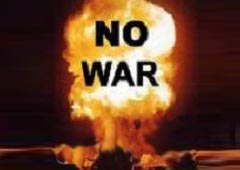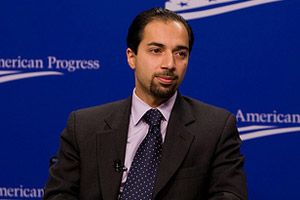It is not hard to imagine how Americans would react if they learned that Al Qaeda had hired top lobbyists to help promote its agenda in Congress. Or if they heard that influential active and  retired government officials were being paid to attest to Hezbollah’s good character. They would be appalled.
retired government officials were being paid to attest to Hezbollah’s good character. They would be appalled.
But, amazingly, a group similar to Al Qaeda and Hezbollah is doing just that. It is the Mujahedin-e Khalq (MEK), an Iranian exile group that is on the Department of State’s list of Foreign Terrorist Organizations alongside other more prominent groups such Al Qaeda, Hezbollah, Hamas, and Al-Shabaab.
The MEK wants to be removed from the terrorist list because, by law, its presence there prevents it from directly promoting its agenda in Washington, and most importantly, from fundraising. So it has recruited some of officialdom’s biggest names to convince Secretary of State Hillary Clinton to "delist" MEK and free it from the current limitations on its activities. News reports predict that Clinton is seriously considering the move and will make a decision by month’s end.
According to the New York Times, among the "luminaries" promoting "delisting" are former New York mayor Rudolph Giuliani; former Vermont governor Howard Dean; former NATO commander Wesley K. Clark, President Obama’s former national security adviser Gen. James Jones; former F.B.I. director, Louis Freeh; former New Mexico governor Bill Richardson; former attorney general Michael B. Mukasey; and Lee H. Hamilton, the former congressman who was co-chairman of the 9/11 Commission. The Times report notes that the MEK endorsers are paid handsome sums (up to $100,000) for speaking out in its behalf.
The MEK’s hired guns say that it does not belong on the list because it long ago abandoned its violent ways. But its record is so long and so bloody that only the very credulous can believe that it turned a new leaf. And there is doubt whether the MEK is even a peaceful movement today. An FBI report from 2004 noted that the agency had reason to believe that the group was still "planning and executing acts of terrorism."
It is hard to keep up with the MEK, which changes its positions and alliances as often as a teenager changes baseball caps. That is, in part, because it is more like a cult than a political organization. (Even its supporters agree with that.) Its members are required to lay aside all personal desires and devote themselves completely to the MEK leader in a manner eerily similar to the Jim Jones Jonestown cult.
The Mujahedin-e Khalq started out supporting the Iranian revolution that drove out the Shah and replaced him with the Islamic Republic of Ayatollah Khomeini. That was in the 1970’s, a decade during which the MEK assassinated six U.S. military advisers and civilians in Iran and then participated in the seizure and hostage taking at the American embassy in 1979. It was among Ayatollah Khomeini’s most militant supporters and opposed any compromises with the United States which it called "the satanic force threatening the world…."
But it soon broke violently with the Ayatollah Khomeini regime and dedicated itself to overthrowing it. It relocated to, of all places, Iraq and allied itself with Iran’s then arch enemy, Saddam Hussein. Saddam gave the MEK a military base inside the country, from which to conduct its war against Iran and Saddam’s other enemies.
During the Iran-Iraq war, the Times notes, MEK "served as Mr. Hussein’s own private militia….For two decades he gave the group money, weapons, jeeps and military bases along the border with Iran." In 1991, the MEK helped Saddam crush the Shiite uprising in the south and eradicate the Kurds in the north. Reports of Iranian dead at the hands of the MEK range from several hundred to thousands.
Following the 2003 U.S. invasion of Iraq, American forces disarmed the MEK camp, although some 3,400 MEK members remain there today despite the natural determination of the current government to get a pro-Saddam encampment out of the country. (Most observers believe that a large percentage of the people at the camp are being held against their will, with no means to escape or place to escape to.)
And that brings us back to the current effort to "delist" the MEK. One of the ostensible reasons MEK’s advocates use is that "delisting" would allow innocent people in the camp to get out and seek refuge in other countries. But freeing the captives can be accomplished through the combined efforts of the U.S. military, the International Red Cross and the United Nations who can go in and separate out the hostages from the terrorists, who should be prosecuted. Delisting is irrelevant in that context.
So why the effort to delist? The MEK wants to be free to ensconce itself in Washington and other world capitals and play the role of a legitimate Iranian opposition, similar to what Ahmad Chalabi and his Iraqi National Congress did prior to the Iraq war. Also like the Chalabi group, the MEK seeks to align itself with American neoconservatives (many of whom already support it) and agitate for a U.S. invasion of their home country.
That analogy is an especially telling one because the MEK is despised in the nation it would like to "liberate." According to Ray Tayekh, a scholar at the Council on Foreign Relations, the MEK has absolutely no standing whatsoever to play a role in Iran, and not just because Iranians hate the organization for having joined Saddam’s war against the country.
At a House Foreign Affairs Committee hearing last month, he testified that the group’s "alliance with Saddam and its cult-like dispositions have alienated even the radical segments of intelligentsia that once found its ideological template attractive. … The Iranian populace is seeking ways of liberalizing its society and not embracing yet another ideological movement with totalitarian tendencies."
Given all this, it is amazing that any American would ally himself with the MEK. After all, what end does delisting serve other than to liberate a former terrorist group so that it might more effectively promote U.S. involvement in another Middle East war. That is, in fact, precisely why prominent neocons support delisting, just as they supported Chalabi.
"If the group is taken off the list, not as a result of an objective review, but by virtue of their lobbying prowess, several repercussions can be envisioned," Trita Parsi, president of the National Iranian American Council, a pro-democracy group, wrote earlier this year.
Some of these serious repercussions would be felt by the Iranian people. Because the group is despised by Iranians across the ideological, political and social spectrum, legitimizing it here might delegitimize the democracy movement there. [..]
It is likely that most of the people who lend their names to the MEK’s campaign have no idea what the group is and simply accepts money from it as an honorarium for making a speech, as if the MEK was like any other group that opposes the Iranian regime and supports U.S. policy goals. It isn’t. The MEK is indeed an enemy of the Iranian regime. But it is also our enemy. In other words, sometimes the enemy of our enemy is not our friend.
By MJ Rosenberg


